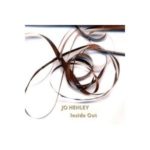
Listening to Inside Out, Jo Henley’s twinkly new album, this line, “Someone else may call you beautiful, but only I can break your heart,” hit me with more force than any piece of music in recent memory save for an impromptu performance by Don Butcher of John Prine’s “Hello in There.” It was as if Jo Henley—Andy Campolieto and Ben Lee—accessed my journal and culled the song from it. It was if they had pursued the lyrics, harmony, and melody as far as they possibly could, so far the symbols ceased to be symbols and became the thing they were meant to signify. It was if all of the impenetrable barriers of communication had finally come tumbling down. The song was me.
Using music to understand love is burned into the modern human’s DNA. When this relationship is at its best, the songwriter is able to take his or her own subjective experience and transform it into a beautiful and universal thing for the listener to write their own subjective experience upon. The song becomes the catalyst and ultimately the container for the listener’s reflections. The song becomes a personal relic full of sorrow, frustration, and hopefully redemption. The song takes up residence in the listener’s thoughts and becomes the memory. On one level, this seems a little creepy, but songs are so much prettier than actual people. Or the memories of them.
The songs on Inside Out are readymade vessels for the listener’s thoughts. So much so one almost fails to notice how much objectively good music is on the album. Trey Anastasio’s longtime rhythm section of Tony Markelis and Russ Lawton provide a gracefully understated foundation for Campolieto and Lee’s clean, sparkly guitars and soulful voices. Songs like “The Fire” stroll along pleasingly and contain hidden lyrical gems like “I said something about the weather. You said you’re leaving me again.” Songs like “Gonna Make It Right” feature an effortless melody and sunny mandolin riff. Songs like “Getting Good at Goodbye” have the potential to make it to the top of the pop and country charts. The album in full provides a pleasant and somber experience worth many repeated visits. Like many of Prine’s albums, this album is sure to help out more than one lost soul. And after all, isn’t that what music is for?



No Comments comments associated with this post